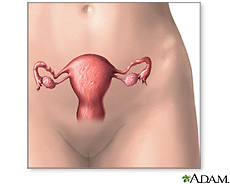 |
 |
 |
Other Health Topics:

-
Related Topics
-
Go Local
- Services and providers for Hysterectomy in the U.S.
-
Languages
- Arabic (العربية)
- Chinese - Simplified (简体中文)
- Chinese - Traditional (繁體中文)
- French (français)
- Hindi (हिन्दी)
- Japanese (日本語)
- Korean (한국어)
- Portuguese (português)
- Russian (Русский)
- Somali (af Soomaali)
- Spanish (español)
- Vietnamese (Tiếng Việt)
Hysterectomy
A hysterectomy is an operation to remove a woman's uterus. The uterus is the place where a baby grows when a woman is pregnant. Sometimes, the ovaries and fallopian tubes also are taken out. Hysterectomies are very common - one in three women in the United States has had one by age 60.
Your health care provider might recommend a hysterectomy if you have
- Fibroids
- Endometriosis not cured by medicine or surgery
- Uterine prolapse - when the uterus drops into the vagina
- Cancer of the uterus, cervix, or ovaries
- Vaginal bleeding that persists despite treatment
- Chronic pelvic pain; surgery can be a last resort
Before having a hysterectomy, it is important to discuss other possible treatments with your health care provider. A hysterectomy will stop your periods, and you will no longer be able to get pregnant. If the surgery removes both ovaries, you will enter menopause.
National Women's Health Information Center
Start Here
-
Hysterectomy(National Women's Health Information Center)
Also available in Spanish
-
Hysterectomy
 (Patient Education Institute) - Requires Flash Player
(Patient Education Institute) - Requires Flash Player
Also available in Spanish
| Basics | Learn More | Multimedia & Cool Tools |
|---|---|---|
| Research | Reference Shelf | For You |
|
-
Overviews
- Abdominal Hysterectomy(Mayo Foundation for Medical Education and Research)
-
JAMA Patient Page: Hysterectomy(American Medical Association)
Also available in Spanish
-
Specific Conditions
-
Laparoscopically Assisted Vaginal Hysterectomy(American College of Obstetricians and Gynecologists)
Also available in Spanish
-
Laparoscopically Assisted Vaginal Hysterectomy(American College of Obstetricians and Gynecologists)
-
Related Issues
- Alternatives to Hysterectomy(Cleveland Clinic Foundation)
- Pap Smear: Still Necessary after Hysterectomy?(Mayo Foundation for Medical Education and Research)
-
Pictures & Photographs
- Types of Hysterectomy(Agency for Healthcare Research and Quality)
-
Tutorials
-
Hysterectomy(Patient Education Institute) - Requires Flash Player
Also available in Spanish
-
Hysterectomy(Patient Education Institute) - Requires Flash Player
-
Videos
- Abdominal Hysterectomy with Coagulating Shears(OR-Live) - Requires Flash Player - One hour program - 9/11/2007
- Laparoscopic Supracervical Hysterectomy(OR-Live) - Requires Flash Player - One hour program - 10/18/2007
- Radical Hysterectomy Procedure for Cervical Cancer(OR-Live) - Requires media player - One hour program
- Robot-Assisted Gynecologic Oncology Surgery(OR-Live) - Requires Flash Player - One hour program - 4/24/2008
- Robot-Assisted Hysterectomy(OR-Live) - Requires media player - One hour program - 9/20/2006
- Robotic-Assisted Hysterectomy(OR-Live) - Requires Flash Player - One hour program - 10/02/2007
- Robotic-Assisted Hysterectomy for Endometrial Cancer(OR-Live) - Requires media player - One hour program - 2/21/2007
- Total Laparoscopic Hysterectomy Using Electrosurgery(OR-Live) - Requires Flash Player - One hour program - 09/20/2007
-
Anatomy/Physiology
- Description of the Uterus(National Uterine Fibroids Foundation)
-
Clinical Trials
-
ClinicalTrials.gov: Hysterectomy
 (National Institutes of Health)
(National Institutes of Health)
-
ClinicalTrials.gov: Hysterectomy
-
Journal Articles
References and abstracts from MEDLINE/PubMed (National Library of Medicine)
- Article: Pudendal neuropathy involving the perforating cutaneous nerve after cystocele repair...
- Article: Fallopian tube prolapse after total laparoscopic hysterectomy.
- Article: Compartment syndrome with thrombosis of common iliac artery after gynecologic...
- Hysterectomy -- see more articles
- Medical Encyclopedia Return to top
-
Directories
- ACOG's Physician Directory(American College of Obstetricians and Gynecologists)
-
Organizations
- American College of Obstetricians and Gynecologists
-
National Women's Health Information Center(Dept. of Health and Human Services)
Also available in Spanish
-
Statistics
- Hysterectomy in the United States, 2000-2004(Centers for Disease Control and Prevention)
- Hysterectomy Statistics(National Uterine Fibroids Foundation)
| Home | Health Topics | Drugs & Supplements | Encyclopedia | Dictionary | News | Directories | Other Resources | |
| Disclaimers | Copyright | Privacy | Accessibility | Quality Guidelines U.S. National Library of Medicine, 8600 Rockville Pike, Bethesda, MD 20894 National Institutes of Health | Department of Health & Human Services |
Date last updated: 05 September 2008 Topic last reviewed: 23 July 2008 |






